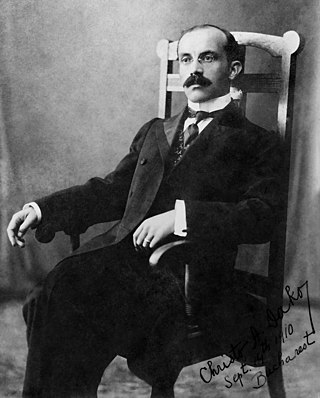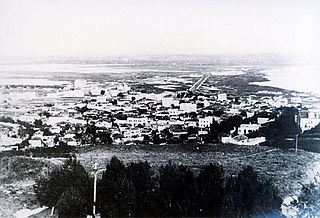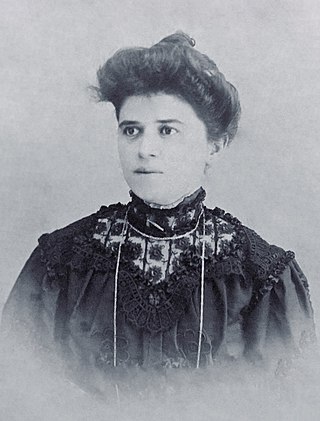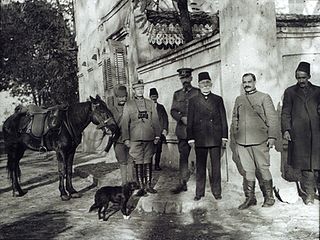
The Congress of Lushnjë, historically documented by the name Mbledhja Kombiare Lushnje, was a conference of Albanian political leaders held from January 28 to January 31, 1920 in Lushnjë, Albania.

Turhan Pasha Përmeti was an Albanian politician and statesman who served as the second prime minister of Albania, serving from March 1914 to September 1914 and from December 1918 to January 1920. He was also in service of the Ottoman state and held the title of Pasha of the Ottoman Empire.

Idhomen Jovan Kosturi, also known as Idhomeno Kosturi, was an Albanian politician, regent and once acting Prime Minister of Albania. He would become the second representative of Albanian Orthodox population to become head of the Albanian government, after Pandeli Evangjeli. Kosturi was also among the contributors to the first Albanian teachers' school, the Shkolla Normale e Elbasanit, a teacher training institution that was founded on 1 December 1909 in Elbasan.

The Principality of Albania was a short-lived monarchy in Albania, headed by Wilhelm, Prince of Albania, that lasted from the Treaty of London of 1913 which ended the First Balkan War, through the invasions of Albania during World War I and the subsequent disputes over Albanian independence during the Paris Peace Conference of 1919, until 1925, when the monarchy was abolished and the Albanian Republic declared.

Fejzi Bey Alizoti was an Ottoman and later Albanian politician who served as the Chairman of the Central Administration of Albania from January 1916 to October 1918. He never held the title "prime minister" as is commonly misconceived.

Pandeli Sotiri (1842–1892) was an Albanian activist that acted as director of the first Albanian school of modern times in Korçë. Sotiri was one of the most important Rilindas figures that contributed in the propagation of the Albanian language. He also worked on one of the versions of the Albanian alphabet. The Congress of Monastir based Albanian's alphabet mostly on Sotiri's precedent work.

Abdurrauf Fico (1881–1944), also known as Rauf Fitso Bey was an Albanian ambassador and politician.

Eshref Effendy Frasheri, also referred to as Eshtref Bey Frashëri, was an Albanian politician. He served as co-Chairman of the National Council of Albania from 1921 until 1923 and Deputy Chairman 1932-1938.

Boboshticë is a village in the former Drenovë Municipality of the Korçë County in southeastern Albania. At the 2015 local government reform it became part of the municipality Korçë.

Kristo Dako (1880–1941), son of Anastas Dako, was an Albanian patriot and publisher of the early 20th century.

The Ministry of Finances and Economy is a department of the Albanian Government, responsible for matters relating to economic policy, the central government budget, taxes, banking, security and insurance, international economic work, central, regional and local government.

The Congress of Durrës was a conference of Albanian political leaders, held from December 25 to December 27, 1918, in Durrës, at the time capital of the Principality of Albania.

Sevasti Qiriazi-Dako was an Albanian patriot, educator, Protestant missionary, author, pioneer of Albanian female education, and activist of the Albanian National Awakening.

Society for the Publication of Albanian Letters was a patriotic organization of Albanian intellectuals, promoting publications in Albanian, especially school texts, which were extremely important for the younger generation's education. It was founded on 12 October 1879 in Istanbul, Ottoman Empire.

Luigj Bumçi was an Albanian Catholic religious and political figure.

Aqif Pasha Biçaku mostly known as Aqif Pashë Elbasani was an Ottoman Albanian political figure in the Sanjak of Elbasan and after the Young Turk Revolution became an activist for the Albanian national cause.
Stefanaq Pollo was an Albanian academic, professor and historian during Communist Albania.

The Përmeti I Government was the 2nd ruling government of Albania, formed on 14 March 1914, following the arrival of Prince Wied in the country.

Malli i Mëmëdheut was the first Albanian patriotic organisation in the United States. Founded on December 31, 1905 in Jamestown, New York State by Albanian immigrants from the region of Korçë, its purpose was the protection and promotion of Albanian culture, and mutual assistance between Albanians in the country.

Zija Dibra was an Ottoman and later Albanian officer and politician, Minister of Foreign Affairs and Minister of War of Albania.



















